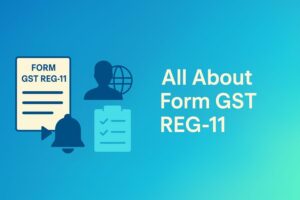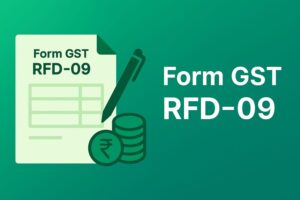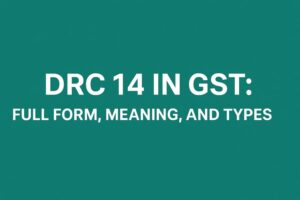GST Exemption Limit in India
- 21 Nov 24
- 10 mins

GST Exemption Limit in India
- Overview of GST Registration Thresholds: Previous and Updated Limits
- Classification of States for the Applicability of New GST Turnover Limits
- Categories with Compulsory GST Registration Requirements
- GST Exemption Limit for the GST Composition Scheme
- How to Check If Your Business Meets the GST Threshold?
- Circumstances Where GST Registration is Mandatory
- Consequences of Non-Compliance with GST Registration Guidelines
- Benefits of GST Compliance
- Conclusion
Key Takeaways
- GST Exemption Limits:₹40 lakh for goods and ₹20 lakh for services in most states.
- Mandatory Registration: Inter-state, e-commerce, and reverse charge businesses must register regardless of turnover.
- Simplified Compliance: Composition Scheme available for businesses with turnover up to ₹1.5 crore.
- Avoid Penalties: Non-compliance with GST registration leads to fines and legal action.
- Claim ITC: GST compliance allows claiming input tax credit and boosts market credibility.
According to the Goods and Services Tax rules in India, if any business exceeds the standard revenue threshold, it must register and pay GST. The current GST exemption limit for goods is ₹40 lakh and for services, it is ₹20 lakh. Businesses with turnover below these limits are not obligated to register for GST.
The exemption limit for certain states in India is ₹20 lakh for the supply of goods and ₹10 lakh for the services. To establish uniformity, the GST council has declared that GST registration is mandatory for any business with ₹40 lakh and above turnover.
Overview of GST Registration Thresholds: Previous and Updated Limits
- Previous Limits Until 31st March, 2019, for Sales of Goods and Supply of Services:
For normal category states, registration was needed if the turnover crossed ₹20 lakh. For special category states, if turnover exceeded ₹10 lakh, registration was mandatory for them.
- Updated Limits Which Are Effective From 1st April, 2019, for Sales of Goods and Supply of Services:
Taxpayers from normal category states now need to register for GST if their turnover exceeds ₹40 lakh for the sales of goods. For special category states, when the turnover crosses ₹20 lakh, registration is mandatory.
For offering services, there are no such changes in registration thresholds. Whenever the turnover exceeds ₹20 lakh in normal category states and ₹10 lakh in special category states, GST registration is a must.
Classification of States for the Applicability of New GST Turnover Limits
With the implementation of new changes in the GST exemption limit, States and Union Territories had the option either to adopt the new exemption limit or continue with the previous limit. One thing needs to be kept in mind that exempt supply does not include goods and service tax. Following are the details of preferences made by various states:
Normal Category States Opting for ₹40 Lakh (New Limit)
The states mentioned below have set the new exemption limit for the sales of goods to ₹40 lakh:
- Maharashtra, Andhra Pradesh, Haryana, Goa, Gujarat
- Punjab, Karnataka, Himachal Pradesh, & Uttar Pradesh
- Daman Diu, Lakshadweep, West Bengal, Dadra and Nagar Haveli
- Madhya Pradesh, Rajasthan, Tamil Nadu, & Odisha
- Andaman and Nicobar Islands, Chandigarh, Himachal Pradesh
However, Telangana has decided to maintain the earlier limit of ₹20 lakh.
Special Category States Following the New Limit

Jammu, Kashmir, Ladakh, Assam, and Himachal Pradesh have chosen to keep their exemption limit for the sale of the goods to ₹40 lakh.
Special Category States Choosing for the Limit of ₹20 Lakh
Following are the states who have chosen the limit of ₹20 lakh:
- Puducherry, Tripura, Meghalaya and Mizoram
- Uttarakhand, Arunachal Pradesh, Sikkim and Manipur
Note 1: Kerala has the authority to enforce a 'calamity cess' of up to 1% on all intra-state supply of goods and services.
Note 2: The hilly states of Jammu & Kashmir and Assam have also decided to set a new exemption limit to ₹40 lakh. As Special Category States, they had the option to maintain a lower threshold, but even earlier, when they could have applied GST on turnover exceeding ₹10 lakh as taxable supplies, they opted for a higher limit of ₹20 lakh instead.
Categories with Compulsory GST Registration Requirements
GST registration is mandatory for certain types of entities and it does not depend on any business turnover. Following is the list of those individuals:
- Online Service Providers Outside India: Providers who provide financial services from overseas to a non-registered person in India.
- Casual Taxable Individuals: Individuals who often take on transactions associated with the supplying of goods and services in a single or different state. Such people have no permanent place for their business.
- Individuals Taxable under Reverse Charge Basis: People who are likely to pay GST under the reverse charge mechanism. In this system, the recipients are bound to pay GST and not the suppliers.
- Individuals Making Sales on Behalf of Others: This goes for agent and principal, both.
- Non-resident Taxable Persons: This applies to those individuals residing outside India who supply goods or services to the residents of India.
- Persons Required to Deduct TDS Under GST: Under GST regulations, this is mandatory for a few entities to deduct tax at source.
- Persons Required to Deduct TCS Under GST: Those are mandated to collect tax at source.
- E-commerce Operators: This is for those entities providing platforms for others to supply services or goods through it.
- GST for Healthcare Services: Healthcare services offered in hospitals are usually exempted under GST. However, 5% GST will be levied when the hospital room rent will exceed Rs. 5,000 per day.
- Suppliers Working Through E-commerce Operators: These operators are liable to collect tax at the source.
- Interstate Suppliers: Suppliers providing services and goods across different state lines.
- Input Service Distributors: Entities that provide services to different locations receive invoices and then distribute the same to these specified locations.
- List of Goods and Services Exempt Under GST: Agricultural products, petroleum products, basic food items like fresh milk, handicrafts fabrics like raw silk are exempted from GST registration limits. Personal care products, pharmaceuticals, human blood supply, agricultural services and ambulance services are exempted.
These certain changes in the limit for GST registration ensure that smaller businesses can incur profits and their tax burden gets reduced. Their extra pressure of handling operations gets smoothened with such changes. However, those important sectors and industries are subject to the regulation and need to adhere to the GST guidelines.
GST Exemption Limit for the GST Composition Scheme
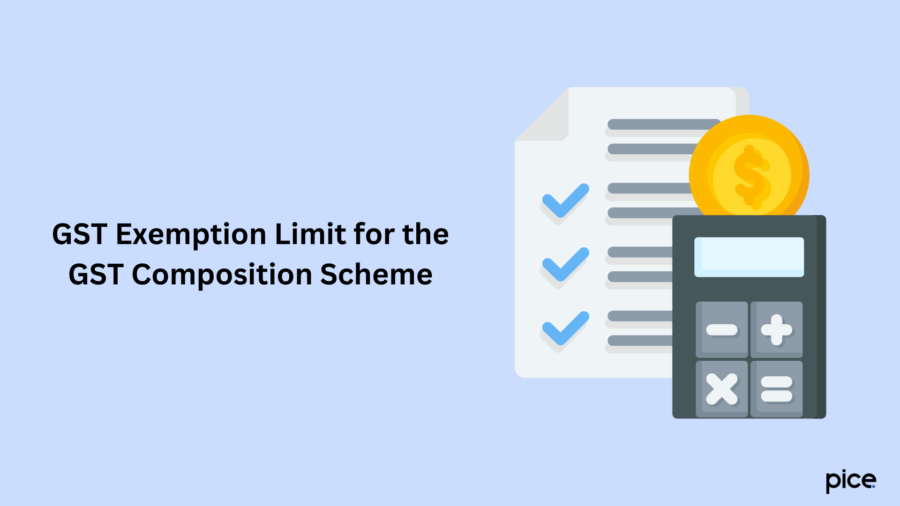
The GST composition scheme is designed for small businesses. It is an alternative way to levy a tax to ease the compliance burden for these small businesses. Any small business can leverage this scheme because they do not need to pay a higher GST rate. Along with that, the process does not involve any complications.
By opting for this scheme, small taxpayers can make quarterly tax payments and file returns annually. Such taxpayers often avail this scheme to avoid any further compliance-related problems.
Updated Provisions in the Composition Scheme
As per the changes made on April 1, 2019, the eligibility threshold under this scheme has been revised to ₹1.5 crore. Such changes pushed more businesses to consider this scheme. The primary benefit they have incurred from this scheme is their quarterly tax payment and annual GST return filings.
However, the threshold has remained at ₹75 lakh in North Eastern and Uttarakhand. The same increased the minimum threshold limit also applies to restaurants that do not serve alcoholic beverages.
The composition scheme was previously restricted only to traders and manufacturers. Now, this scheme has included the service providers, especially the independent service providers. Such entities must supply both goods and services and their aggregate turnover must be of ₹50 lakh in the previous financial year.
Those service providers who are eligible for this scheme need to pay a fixed tax rate of 6% (CGST and SGST have to be 3% each).
How to Check If Your Business Meets the GST Threshold?
One needs to have a clear idea of their aggregate turnover to understand the GST threshold exemption limit. This calculation comprises:
- Revenue from Sales and Services: This includes the entire income obtained from the sale of good and the provisions of the services within India.
- Export Earnings: It encompasses the income incurred from the sale of goods and provisions of services from the international clients.
- Interstate Supplies: It comprises all transactions made across the state boundaries.
- Intra-state Supplies: Intra-state supplies from an unregistered person are free from GST rate if total value does not cross Rs. 5,000 per day as per reverse charge.
Certain types of income are not included in this list which are non-taxable goods, government grants, capital gains and interest income. New businesses and seasonal businesses should calculate their aggregate turnover as per their business model. The businesses that have thrived very recently, need to calculate their yearly turnover for this assessment while seasonal businesses should do the same only on the months they are active.
Circumstances Where GST Registration is Mandatory
Following are the specific circumstances where GST registration is mandatory, no matter whether your business turnover meets the standard exemption limit or not:
- Any businesses using e-commerce platforms for operations need to register for GST mandatorily.
- Businesses active in inter-state supply must register for GST irrespective of their annual turnover.
Consequences of Non-Compliance with GST Registration Guidelines
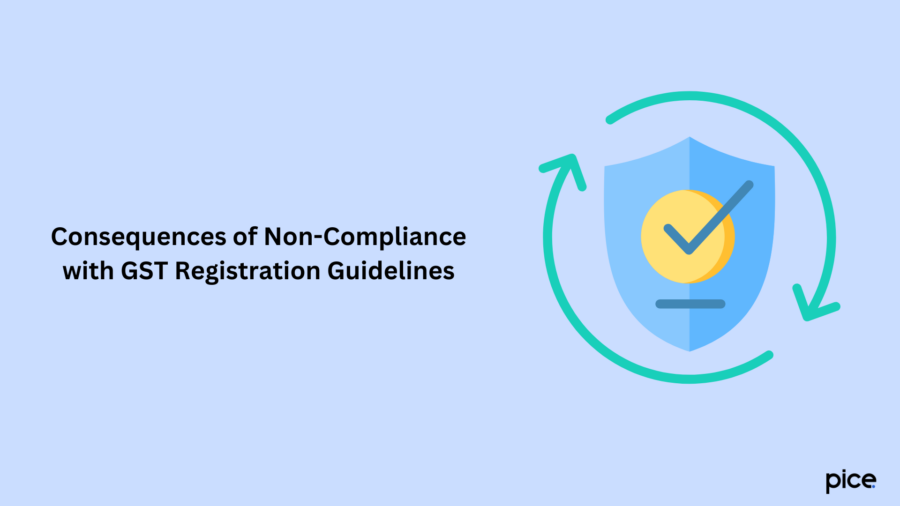
If a business's annual turnover exceeds the GST registration threshold limits and it fails to register, it will face serious consequences, including:
- Their business credibility will be put into question.
- They will have to pay the heavy penalties.
- Legal actions will be taken against this business.
Benefits of GST Compliance
Understanding the minimum GST registration limit and following the updated GST registration threshold limit is advantageous for businesses that include:
- Input Tax Credit: Being compliant with the GST regulations authorises businesses to claim the input tax credit. It means that the GST rate paid on the purchases can be deducted. The double taxation will be removed by opting for this ITC.
- Legal Recognition: GST registration sets credibility for the suppliers. Hence, it gives them the legal recognition that authorises them for legal business operations across states.
- Increased Market Credibility: Being compliant increases the business's credibility in the market which further enhances the relationship with the vendors and customers.
Conclusion
Businesses should observe their turnover closely to understand the revised GST exemption limit guidelines. Small and medium-sized businesses must maintain the new limit which is ₹40 lakh for goods and ₹20 lakh for services.
💡If you want to streamline your payment and make GST payments, consider using the PICE App. Explore the PICE App today and take your business to new heights.
 By
By 





